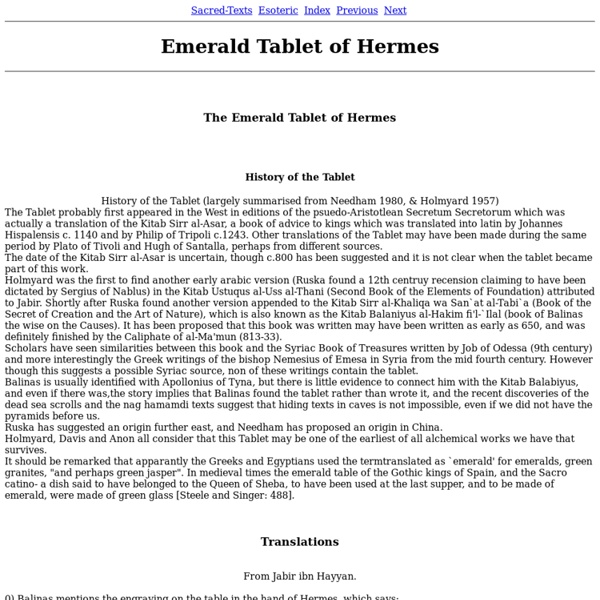T h e E m e r a l d T a b l e t s
alchemical archives
European witchcraft
Belief in and practice of witchcraft in Europe can be traced to classical antiquity and has continuous history during the Middle Ages, culminating in the Early Modern witch hunts and giving rise to the fairy tale and popular culture "witch" stock character of modern times, as well as to the concept of the "modern witch" in Wicca and related movements of "contemporary witchcraft. History[edit] Antiquity[edit] Instances of persecution of witchcraft are documented from Classical Antiquity, paralleling evidence from the Ancient Near East and the Old Testament. In Ancient Greece, for example, Theoris, a woman of Lemnos, who is denounced by Demosthenes, was publicly tried at Athens and burned for her necromancy. In the imperial period, it is evident from many Latin authors and from the historians that Rome swarmed with occultists and diviners, many of whom in spite of the Lex Cornelia almost openly traded in poisons, and not infrequently in assassination to boot. High Middle Ages[edit]
Hermeticism
Philosophy based on the teachings of Hermes Trismegistus Hermeticism, or Hermetism, is a philosophical system that is primarily based on the purported teachings of Hermes Trismegistus (a legendary Hellenistic combination of the Greek god Hermes and the Egyptian god Thoth).[1] These teachings are contained in the various writings attributed to Hermes (the Hermetica), which were produced over a period spanning many centuries (c. 300 BCE – 1200 CE), and may be very different in content and scope.[2] In 1964, Frances A. Yates advanced the thesis that Renaissance Hermeticism, or what she called "the Hermetic tradition", had been a crucial factor in the development of modern science.[7] While Yates's thesis has since been largely rejected,[8] the important role played by the 'Hermetic' science of alchemy in the thought of such figures as Jan Baptist van Helmont (1580–1644), Robert Boyle (1627–1691) or Isaac Newton (1642–1727) has been amply demonstrated.[9] Etymology[edit] History[edit]
Adept
An adept is an individual identified as having attained a specific level of knowledge, skill, or aptitude in doctrines relevant to a particular author or organization. Etymology[edit] The word "adept" is derived from Latin adeptus 'one who has attained' (the secret of transmuting metals).[1] Authors[edit] H. Although Madame Blavatsky makes liberal use of the term adept in her works[2] to refer to their minor function as caretaker of ancient occult knowledge. Alice Bailey[edit] In Alice Bailey's body of writing she outlines a hierarchy of spiritual evolution and an initiatory path along which an individual may choose to advance. Orders[edit] Various occult organizations have steps in which an initiate may ascend in their own magical system. Hermetic Order of the Golden Dawn[edit] A∴A∴[edit] Aleister Crowley, who formed the A∴A∴, restructured the Golden Dawn system. Temple of Set[edit] The Temple of Set calls their steps degrees, and places adept second. Illuminates of Thanateros[edit] Notes[edit]
Angels
Chaos magic
The chaosphere is a popular symbol of chaos magic. Many variants exist. For more, see Symbol of Chaos. General principles[edit] Chaos magicians are often seen by other occultists as dangerous or worrisome revolutionaries.[2] History[edit] Origins and creation[edit] This magical discipline was first formulated in West Yorkshire, England in the 1970s.[4] A meeting between Peter J. Influences[edit] Following Spare's death, magicians continued to experiment outside of traditional magical orders. Early days[edit] The first edition of Liber Null does not include the term "chaos magic", but only refers to magic or "the magic art" in general.[6] Texts from this period consistently claim to state principles universal to magic, as opposed to a new specific style or tradition of magic, and describe their innovations as efforts to rid magic of superstitious and religious ideas. Chaos came to be part of this movement defined as "the 'thing' responsible for the origin and continued action of events[...].
The Magical Temple
Daemons
Internet Sacred Text Archive Home



